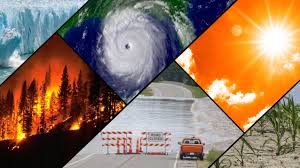Introduction
Climate change is one of the most pressing global challenges of our time. As greenhouse gas emissions rise, the planet's temperature increases, causing severe environmental, social, and economic consequences. Tackling climate change requires a collective effort from governments, industries, and individuals. In this blog, we'll explore the causes and effects of climate change and discuss practical solutions to mitigate its impact.
What is Climate Change?
Climate change refers to long-term alterations in temperature, precipitation, wind patterns, and other elements of the Earth's climate system. It is primarily driven by human activities, such as burning fossil fuels, deforestation, and industrial processes, which release excessive amounts of greenhouse gases (GHGs) like carbon dioxide (CO₂) and methane (CH₄).
Key Causes of Climate Change:
- Burning Fossil Fuels: Coal, oil, and natural gas combustion for energy and transportation.
- Deforestation: Clearing forests reduces the Earth's capacity to absorb CO₂.
- Industrial Emissions: Manufacturing processes contribute to GHG emissions.
- Agriculture: Livestock farming releases methane, while fertilizers emit nitrous oxide.
Impacts of Climate Change
The consequences of climate change are widespread and devastating:
1. Rising Global Temperatures
Average global temperatures have increased, leading to heatwaves, droughts, and wildfires.
2. Melting Ice Caps and Rising Sea Levels
Glacial melting contributes to rising sea levels, threatening coastal communities and ecosystems.
3. Extreme Weather Events
Hurricanes, floods, and storms have become more frequent and intense.
4. Loss of Biodiversity
Changes in ecosystems disrupt habitats, endangering species worldwide.
How to Tackle Climate Change: Key Solutions
1. Transition to Renewable Energy
Switching from fossil fuels to renewable energy sources, such as solar, wind, and hydroelectric power, is crucial for reducing GHG emissions. Governments and industries must invest in clean energy infrastructure and innovation.
2. Promote Energy Efficiency
Adopting energy-efficient technologies in buildings, transportation, and industries can significantly reduce energy consumption and emissions.
3. Support Reforestation and Afforestation
Planting trees and protecting forests enhance carbon sequestration, absorbing CO₂ from the atmosphere.
4. Adopt Sustainable Agriculture Practices
Reducing food waste, using organic fertilizers, and practicing crop rotation can minimize agriculture's carbon footprint.
5. Advocate for Climate Policies
Supporting international agreements, like the Paris Agreement, and encouraging local governments to implement climate-friendly policies can drive systemic change.
6. Practice Sustainable Living
Individuals can make a difference by:
- Reducing energy consumption (e.g., using energy-efficient appliances).
- Minimizing waste through recycling and composting.
- Choosing public transportation or electric vehicles over fossil-fueled cars.
- Supporting businesses with sustainable practices.
Global Initiatives to Combat Climate Change
The Paris Agreement
A landmark international treaty aiming to limit global warming to well below 2°C above pre-industrial levels, with efforts to limit the increase to 1.5°C.
The UN Sustainable Development Goals (SDGs)
The SDGs emphasize climate action (Goal 13), focusing on resilience, adaptation, and mitigation strategies.
The Role of Technology in Tackling Climate Change
1. Carbon Capture and Storage (CCS)
Technologies that capture and store CO₂ emissions can reduce industrial impact.
2. Artificial Intelligence and Big Data
AI tools analyze climate patterns, optimize renewable energy usage, and improve environmental monitoring.
3. Electric Vehicles (EVs)
EVs are transforming the transportation sector by reducing reliance on fossil fuels.
Climate change is a challenge that demands urgent action. By embracing renewable energy, practicing sustainable living, and advocating for climate policies, we can mitigate its impacts and create a sustainable future for generations to come. The fight against climate change begins with awareness and action—let’s work together to protect our planet.




